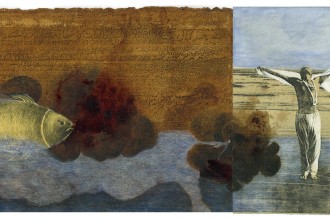Jay clumped down the wide-planked wooden hallway across the porch to the spider-infested garage where the bikes rested. In a few miles he came to the sign: Fly falcons every day.
The proprietor kept three peregrine falcons in a cage on the side of a stone barn. They had yellow talons and beaks, dun-patterned pantaloons, orangish brown chests, slate blue wings and heads and huge all-seeing eyes.
“Fastest animal on earth,†the man said. “Dives at 200 miles an hour. Ever fly one?â€
Jay said, “Never.â€
“Why now?â€
Jay felt as though he were contemplating Schopenhauer; the birds were the philosopher’s meaning. “Would one prey on a trout?â€
“Of course.â€
“See him under water among the rocks?â€
“They see everything.†The man was tall and thin-headed. He wore jeans and a calico shirt and was already pulling on his falconry gloves prior to reaching into the cage for the falcon he called, “Orestes,†for vengefulness, the son who had killed his mother and her lover Aegisthus after they’d killed his father, Agamemnon, when he returned from the Trojan war.
The literacy of a Vermont falconer surprised Jay. “What about dive-bombing a white haired man walking across a lawn with a glass of wine in his hand?â€
“You have someone in mind?â€
Jay imagined fluffs of Steve’s white hair floating in the air as Orestes flew him away and wondered why he had put up with Steve lusting after Lorrie all these years. “I could think of one, but let’s stick to your program.â€
The man mounted Orestes on his glove, unleashed his chained leg, and raised his arm. Orestes streaked into the air and began circling the countryside searching for prey. When he spotted a groundhog, he fell out of the sky like a stone. Jay watched this with binoculars. The groundhog thrashed in a spasm of death. Orestes stood on him and tore at his flesh with his beak—as much as he wanted, for the groundhog was bigger than Orestes’s appetite. At that point, the man whistled. Orestes sliced through the air to the falconer’s glove.
“Now we glove you and you take Agamemnon, his father,†he said to Jay.
A peregrine falcon is not heavy as it looks, but its eyes and beak and talons at arm’s length had the effect of a gun barrel pointed at Jay’s face. The falconer unleashed Agamemnon. His departure was as effortless as it was swift. He lanced upward and then committed the same stone-drop plummet. Apparently the trout stream meandered through the high-grassed meadow. After a splash, he rose up with a snake in this talons. He then landed in the barnyard. Jay and the falconer watched him consume the snake in its entirety. Finally came the whistle and the return, this time to Jay’s gloved hand. The falconer chained Agamemnon’s right leg and encouraged him to resume his perch beside, Jay had no doubt, Clytemnestra.
“Can we fly her?†he asked.
“I don’t fly her, I breed her,†the man said. “It’s her punishment. She’d mate with any falcon she met. To her they’re all Aegisthus. †Now the man had his own falcon look in his eye, predatory, all seeing, remorseless. “I taught classics in high school before I did this.â€
“Live here by yourself?â€
“Live here by myself.â€Â In the manner of a New Englander, he summed up his story in one word: “Divorced.â€
He went out onto the porch and sat there contemplating the swelling nightfall. He recalled the Maltese Falcon and tried to remember if there was a falconry scene in Lawrence of Arabia. He supposed there must be or should be. In everything, Schopenhauer argued, there was will, not Darwinian will, nothing so simple—will represented by a man and his falcons, or two couples fumbling along on vacation or this darkness, black and all-consuming as a falcon’s eye, alive and yet a masterwork of impenetrable stillness. Jay didn’t want to die but death hurtled at him faster than a falcon fell from the sky.




